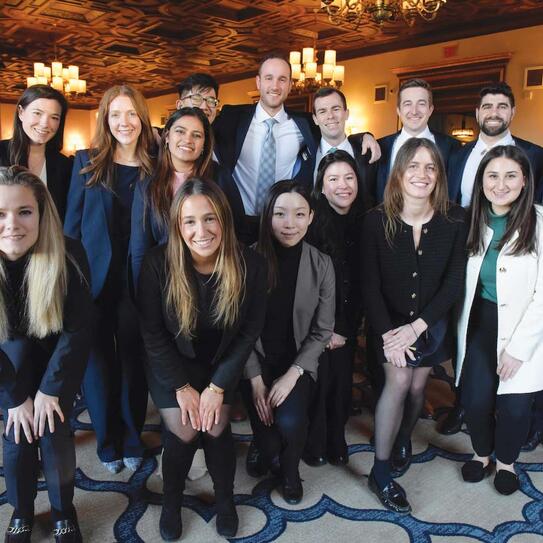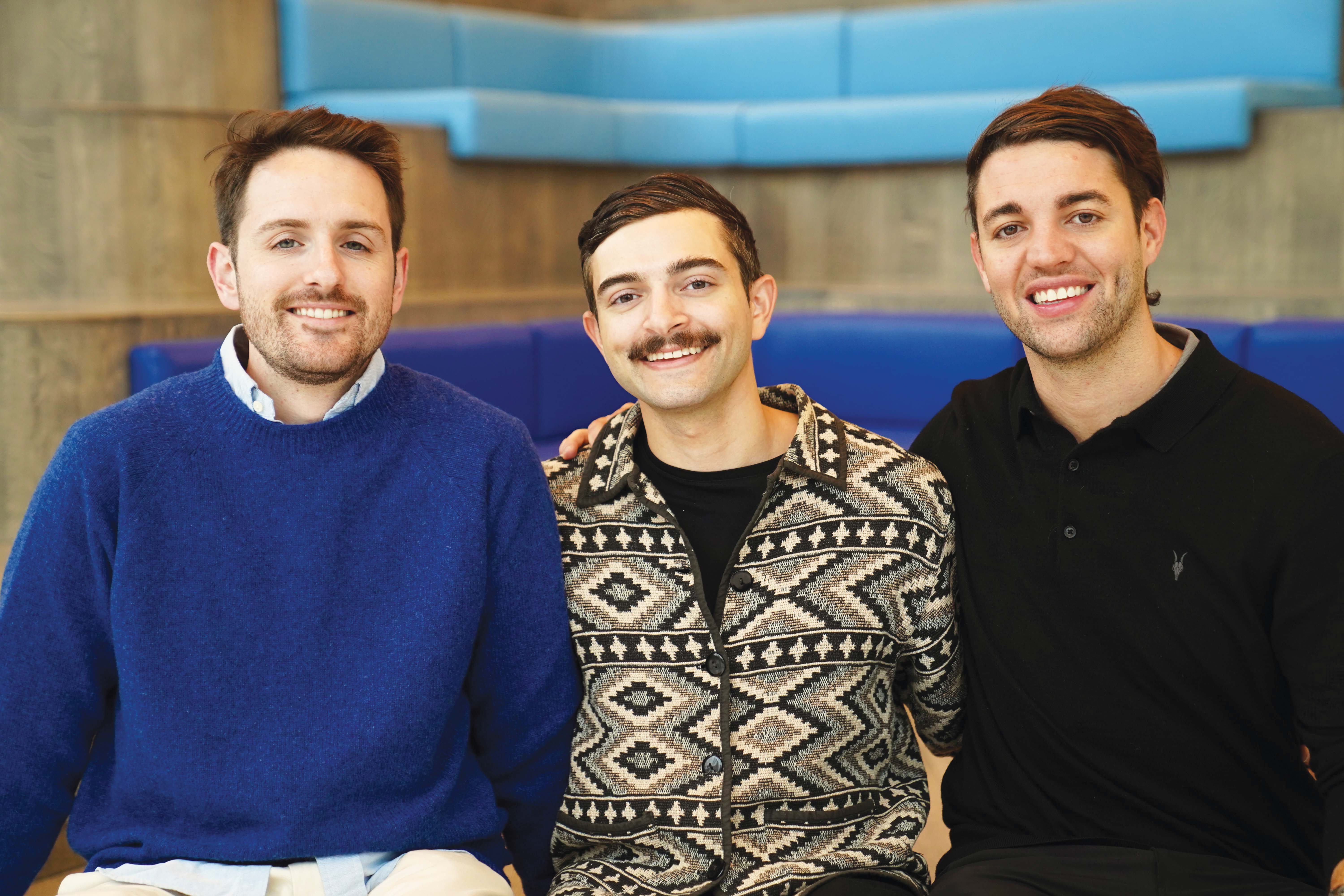
Members of the FinTech Club left to right: Enrique Appellaniz '24, Alexander Cyrus Talati '24, and Juan Cruz Rabbat '24
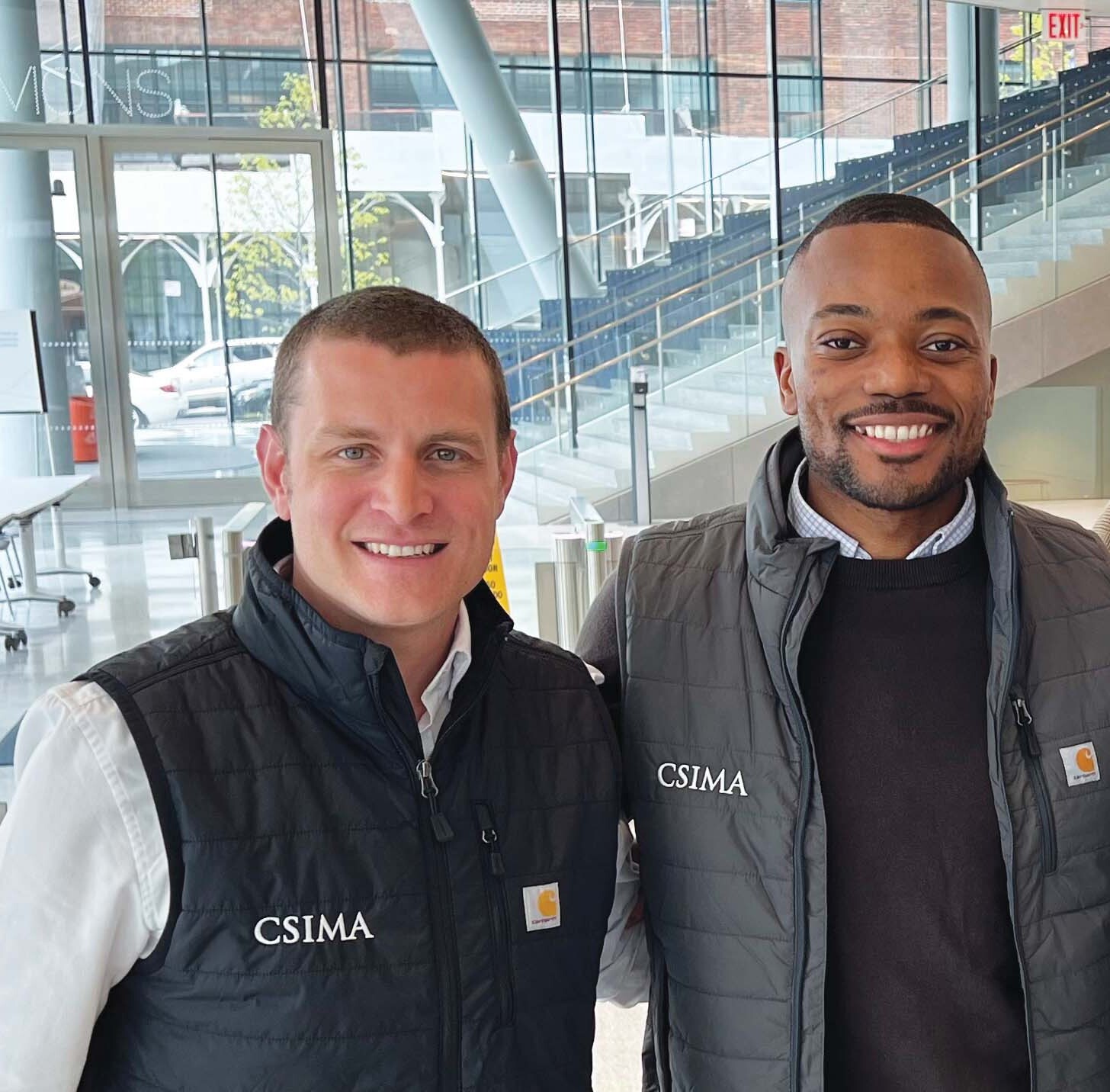
CSIMA Co-presidents Shin Lutondo '24, right, and Tom Marmarelli '24
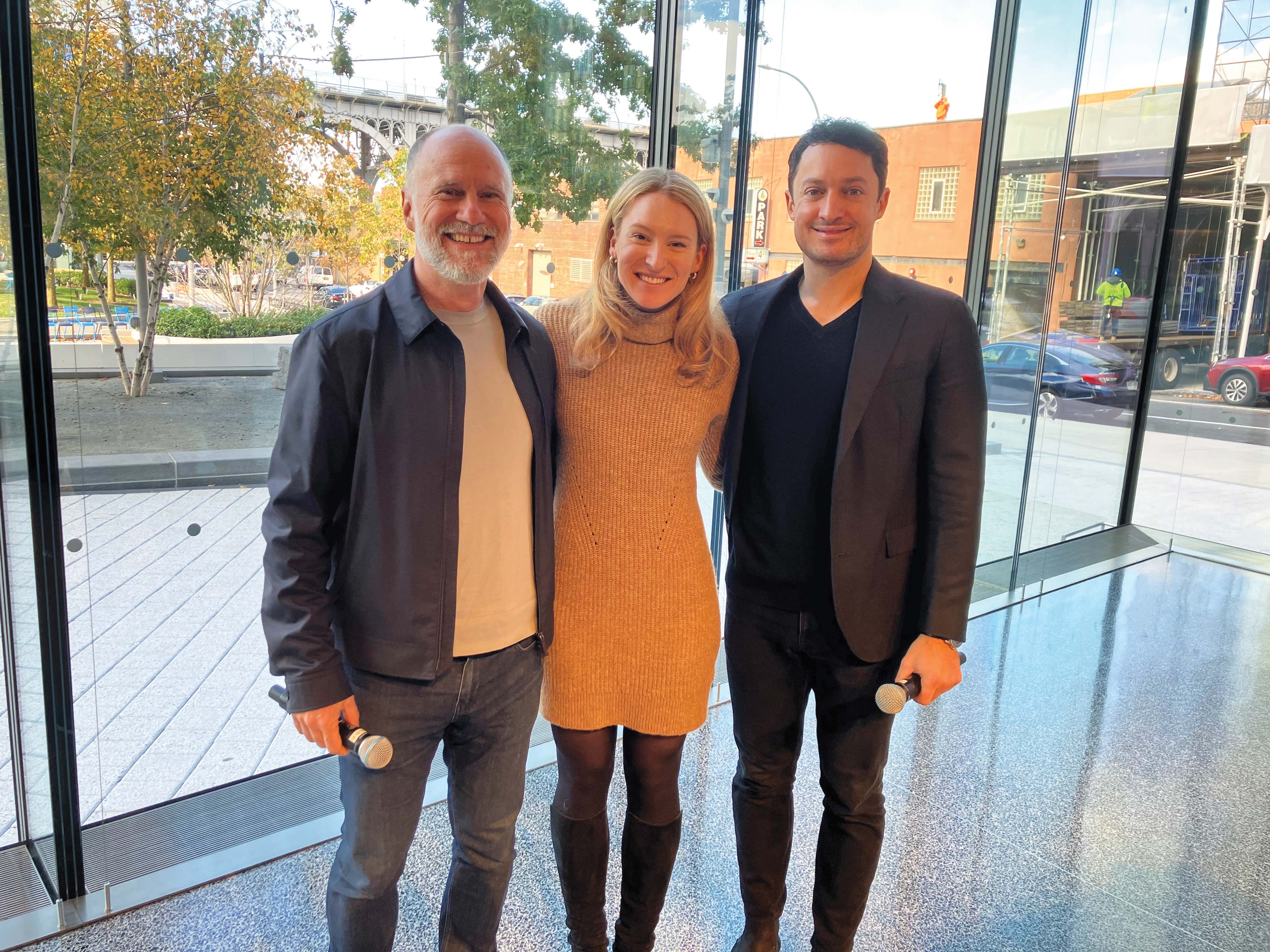
Venture club event with, left to right, author Albert Wnger of Union Square Ventures, Venture Capital Club Co-president Jillian Damaris '24, and Mitt Weinberg '19, partner at Max Ventures
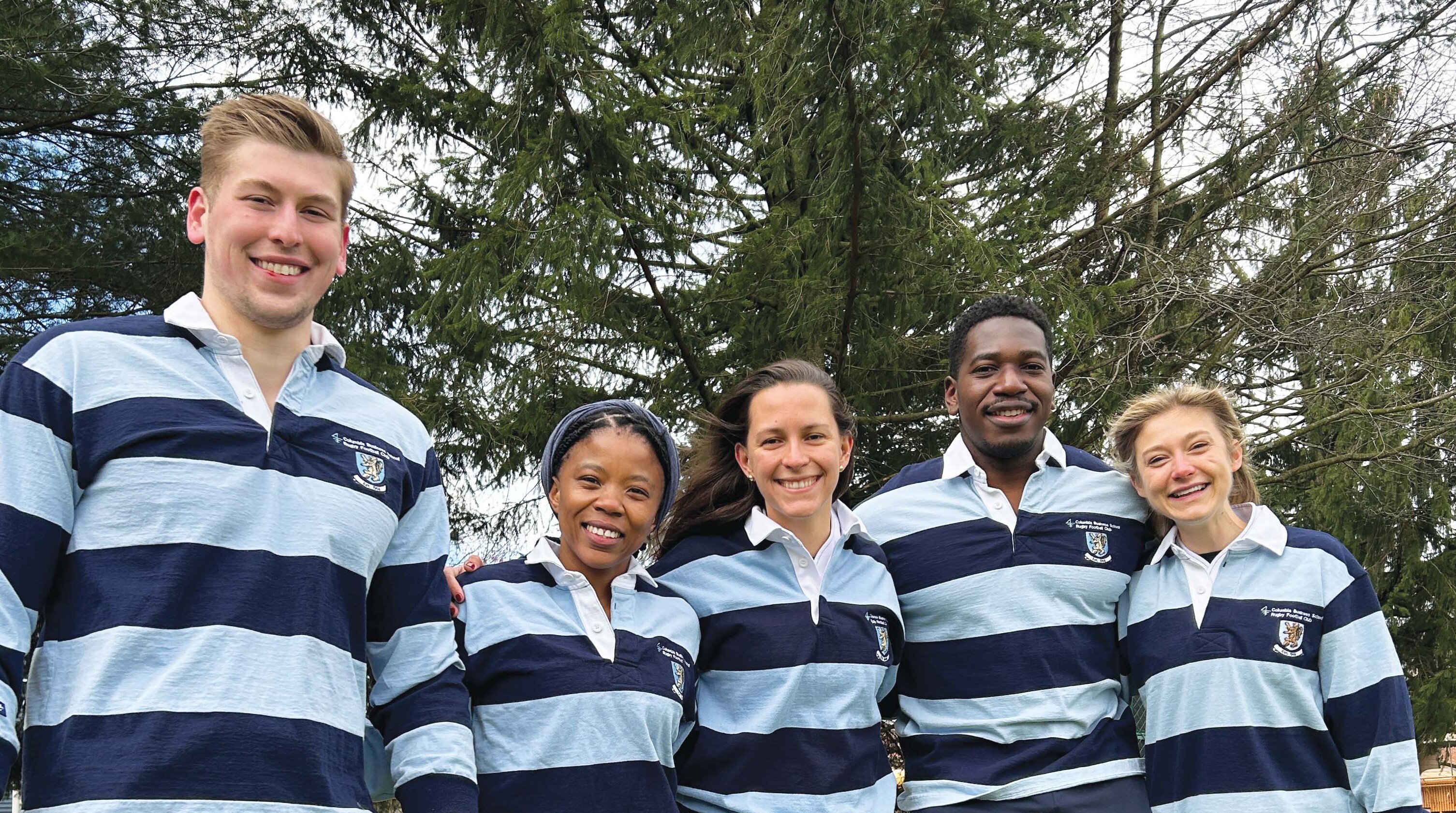
From left: Investment Club Co-presidents Henry Truelove '24, Boiketlo Mphahlele '24, Zoe Coates Fuentes '24 (VP of mentorship), Ife Adebayo '24 (VP of mentorship), and Hunter Sechrest '24 (VP of prospective students and alumni)
On any given night, Shin Lutondo '24 might be invited to attend a “dinner pod” hosted by the Columbia Student Investment Management Association (CSIMA).
One of five professional clubs focused on finance at Columbia Business School, CSIMA provides educational resources, skill-building opportunities, and networking activities for CBS students interested in investing.
At a recent dinner hosted by the club, Lutondo, club co-president, and other randomly selected members of CSIMA dined with value investor Chris Waller '18, founder of Plural Investing. The dinner pods are organized to connect first- and second-year students with young CBS alumni, “whose experience can be significantly helpful to us,” says Lutondo.
At dinner with Waller, the students plied him with questions: How do you conduct research? How do you boost the entire organization? “It was an opportunity to interact and exchange ideas and information,” Lutondo said, “And you never really know what may come out of it. If at least one person gets hired, it's worth our investment.”
CSIMA is one of several CBS student clubs and leadership groups that plan events and activities, connect students with alumni and practitioners, and help them access resources and networks at the School. These clubs are open to students across all the School's degree programs, and while their missions and focus areas span diverse interests, a common thread unites them: equipping members with the skills, experiences, and relationships to secure coveted roles at prestigious companies.
And students do get hired through the opportunities provided by their clubs. They also find avenues for leadership and immersion in areas they're interested in and may plan to pursue.
“The finance clubs consistently impress me,” says Scott Siegel-Ortiz, director of the Office of Student Affairs at CBS.
“We have more than a thousand student club leaders who are truly dedicated to helping improve the experience here,” he says. “We view them as partners. They're coming from full-time careers. They are smart and intuitive, and they are navigating an environment where they have to heavily lean on influence without power to get things done. They are essentially running mini-businesses.”
The Office of Student Affairs does everything it can to ensure those ventures succeed.
“We're very high touch with our clubs,” says Siegel-Ortiz. “We build relationships, help develop skill sets, and partner with offices like financial planning, development, and the Career Management Center to provide additional types of leadership training for students. It's an intense and vibrant community.”
Under the professional finance club umbrella, there are four other groups in addition to Columbia FinTech and Blockchain. While they all provide events and networking opportunities, each club is run by second-year students, and has a unique mission, vision, and set of benefits.
Here's an overview of the major finance-related groups at CBS.
The Investment Banking Club
A Road to Wall Street
With 269 members this year, the Investment Banking Club is one of the smaller finance clubs at CBS. Co-president Boiketlo Mphahlele '24 says that may be because IBC is very clear about its purpose: “We have one mandate: getting people into Wall Street,” she says. “There's very clear buy-in when you join the Investment Banking Club. And I think that's what sets us apart from a lot of clubs.”
With the goal of job placement, Mphahlele and her co-president, Henry Truelove '24, run the IBC agenda around recruiting. “Students recruiting for investment banking need to dedicate a generous amount of time to recruiting events, particularly in the fall semester,” Mphahlele says. The recruiting calendar starts with IBC preparation events, followed by presentations from numerous banks. During the semester, students attend various coffee chats and bank-hosted events. “Our location in New York is helpful because it provides easy access to most banks.”
Dealing with that process is one of the biggest challenges in job seeking, but in IBC, the second-year students mentor the first years.
“This club could not run the way it runs without the board of second years who are dedicated to the mission, but also the broader second year community who volunteer their time,” says Mphahlele. “I think that's what keeps this ecosystem going: a peer mission and a group of second years that are relentless at volunteering their time.”
Columbia Student Investment Management Association
Making Connections
As co-president of CSIMA, Lutondo knew helping to run a club of more than 400 members would provide the perfect opportunity to develop leadership skills. In his 20s, he says, “I thought it would be a good way for me to step out of my shadow around people who are very well experienced in their careers but in a low-risk environment. Now, when I come out of business school, I'll be more prepared with soft skills like management, which is one thing I wanted to improve.”
Lutondo got that chance this year when he and CSIMA Co-president Tom Marmarelli Ashkenazi '24 oversaw the 27th annual CSIMA Conference in February.
The event—which is organized in collaboration with the Heilbrunn Center for Graham & Dodd Investing for students, alumni, faculty, and the greater business community—drew nearly 450 attendees.
“I was really grateful for the entire experience,” Lutondo says. “So many of our students worked really hard to put the conference together, and it was very much a success.”
He says that's in part due to the cohesion of the community, which is built in at the start. Regularly, second-year students meet with first years for “office hours,” where questions can be asked that, “perhaps felt embarrassing to ask in front of a professor.” This peer-to-peer learning environment is the most important benefit of CSIMA, Lutondo says. “That is what really has made a difference. It makes what could be a much more stressful experience a lot more enjoyable because you're doing it as a group. There's a sense of camaraderie that comes with that.”
Private Equity Club
Creating Value
Jackson Gorman '24 says the main reason he and Danielle Schwartz '24 joined the Private Equity Club and became co-presidents is “a deep passion for the industry.” The club is “a really good way to get involved, to learn more, and to network with folks in that world,” he says.
Gorman cites another pivotal reason for joining the club: It offers substantial value to students, and most of that value is helping students land private equity jobs. “To do so, we foster efficient, well-structured organizations,” he says. “Our club hosts regular events and exercises careful budget management, investing resources in diverse and meaningful ways.”
The club actively organizes educational initiatives centered on essential subjects like financial modeling and case studies, equipping members with the hard skills crucial for excelling in private equity interviews. In addition, the members organize social events, maintain a careers committee, and support a professional events group that schedules speakers for talks and panels. Gorman says that can mean going to New York to meet with big firms or a trip to London where last Thanksgiving the group took nearly 20 students to visit some of the city's biggest private equity firms.
“At the end of the day,” he says, “the club does a lot.” And that means Gorman and Schwartz do a lot, too. “Yes, it's a decent amount of work, but it's super-rewarding,” he says.
Venture Capital Club
Building the Columbia Name
Venture Capital Club Co-president Jill Damaris '24 says the club complements her experience as a Eugene Lang Entrepreneurship Center Venture Fellow. “I gained skills as a fellow that were enhanced by club activities such as networking opportunities and recruiting events in my first year,” she says. “The second-year club members were excellent mentors throughout the recruiting process.”
Damaris, now in her second year, and Co-president Jewel Stone '24 are leading the club's efforts to build the Columbia name in the VC ecosystem.
“We try to build relationships with VCs in the city,” she says. “As a center of entrepreneurship, the city draws leading startups and VCs to New York. They are changing the industry, and we want to embed Columbia further in that conversation.”
CBS alumni play a huge role, she says: “I am warmed by how much the alumni are willing to stay connected to CBS. It's instilled in you to help people here, to support those going through what you did. Venture capital isn't straightforward, so having people to rely on makes this ambiguous process easier.”
Columbia Fintech and Blockchain Club
On the Cutting Edge
According to Enrique Apellaniz Aguirre '24, “For tech startups, you can say that Silicon Valley and Boston may be the biggest hubs, but if you think specifically about fintech and blockchain, it's New York.”
Apellaniz joined the Columbia FinTech and Blockchain Club to enhance his understanding of blockchain technology. As co-president of the club with his friends Juan Cruz Rabbat '24 and Alexander Talati '24, he oversees a range of activities geared toward career, education, and networking.
“New York provides great opportunities to bring in speakers or have coffee with industry leaders,” he says. All the leaders in fintech are “one subway train away.”
As far as Apellaniz is concerned, “one of the keys to the success of our club comes from being in New York and leveraging that opportunity. But the other thing is the team we have is absolutely amazing.”
With a lot of events and a small board, he says, one thing they've done correctly is keep people motivated. “Everybody is super-willing to work, and the results speak for themselves.”
